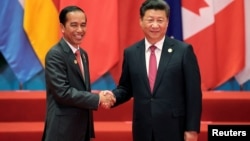Indonesia says it will step up patrols in waters around a group of islands to expel Chinese fishing vessels, putting its economic ties with China at risk but eventually getting an upper hand in the dispute with little fallout, analysts say.
Indonesian President Joko Widodo, who is widely known as Jokowi, said in October his government would never compromise on claims around the Natuna Islands, a chain of 272 tiny land features northwest of Borneo where Chinese vessels pass in nearby waters. He visited the islands during military exercises in September and October.
“There’s a strong feeling among many Indonesian officials that it can both assert its rights over the area it claims as its exclusive economic zone around the Natunas and develop strong economic ties with China at the same time,” said David McRae, senior research fellow with the Asia Institute at the University of Melbourne in Australia.
Widodo also called last year on the two sides to increase two-way trade to $150 billion by 2020. China is Indonesia’s top import source and second biggest export destination for items such as minerals and palm oil.
But the Indonesian Cabinet has developed what experts call a low-risk strategy to stand up for its claim of a 370-kilometer (200 nautical-mile) exclusive economic zone in waters around the Natunas. China cites historical records and says its boats have long fished the same waters.
Domestic concerns
Indonesians, especially fishermen, resent illegal fishing, which had become a problem because of lack of enforcement around the country’s 13,000 islands.
Indonesia itself should reap the fish and natural gas near the Natunas, the president has said.
China claims 95 percent of the 3.5-million-square-km (1.4-million-square-mile) South China Sea, which stretches from Taiwan to Singapore and includes a tract near the Natunas.
Chinese claims infringe as well on exclusive maritime zones established by Brunei, Malaysia, Vietnam and the Philippines. Since 2010, China has bolstered its claims by landfilling small islets in the Paracel and Spratly chains, sending military equipment and positioning oil rigs. Taiwan also claims most of the South China Sea, the center of Asia’s farthest-reaching sovereignty dispute.
Over the past four years, Indonesia has increased patrols for any Chinese fishing vessels, as well as those from other nations, such as Vietnam.
In March, the two countries engaged in a standoff when Indonesian authorities detained a Chinese fishing vessel, but a Chinese coast guard vessel intervened. Also that month, Indonesia said China had officially included waters near the Natuna Islands on a territorial map, a move that Fahru Zaini, chief security minister for defense, told local media had made a “large impact on the security” of that tract of ocean.
In May, the Indonesian navy arrested a Chinese fishing vessel despite Beijing’s coast guard backup. A month later the navy fired on another Chinese boat, possibly injuring a sailor, before impounding it and jailing the seven-person crew.
China has not lashed out at Indonesia or threatened economic retaliation as it does when other countries, such as Japan and the Philippines, test its claims.
“At the moment, both countries seem to have been able to largely compartmentalize those incidents from affecting the economic relations although obviously it must have an effect on anxieties about increasing Chinese assertiveness,” McRae said.
Most of Indonesia’s efforts around the Natuna Islands are preventive rather than reactive, he said. Indonesian officials also avoid reminding Chinese officials in public about past incidents or issuing warnings as the Philippines did under its president from 2010 to mid-2016. China trimmed trade and tourism to the Philippines in 2012.
Two-way street
China needs Indonesia as much as the other way around, analysts say.
Last year Widodo and Chinese President Xi Jinping signed eight agreements partly aimed at letting China build infrastructure in Indonesia. This year in Jakarta, lower-level officials agreed to work together on energy, agriculture and industrial park construction.
“I think there’s definitely a balancing act for the Jokowi administration, but I think the Indonesia-China relationship is an important one to both countries and diverse enough that if the Jokowi administration treats these kinds of incidents and confrontations with enough diplomacy as possible, it will not disrupt investment flows into Indonesia from China,” said Natalie Sambhi, a research fellow at the Perth USAsia Centre in Australia.
Chinese firms need new markets for construction as their own becomes saturated or too competitive. The Chinese government has sighted Indonesia as part of its “maritime silk road” initiative to foster investment in countries around Asia and in Europe.
“Indonesia is an important component of the way China sees the strategic landscape in the Asia Pacific, particularly as a key state in Southeast Asia, and it would be a boon for China to maintain its relationships with Indonesia on the basis of its wanting to implement things like its maritime silk road and its one belt, one road initiative,” Sambhi said.
But Indonesia, an exporter of commodities to world markets as well as a massive domestic market built on a population of 250 million, depends less on Chinese economic support than other parts of Asia.
China is Japan’s second most significant trading partner, a relationship worth $125 billion in 2014. Malaysia counts China as its top trading partner and source of direct foreign investment.
“Indonesia feels less concerned about Chinese response because it’s less dependent on Chinese invest and infrastructure development than some of the other more developed countries in Southeast Asia,” said Carl Baker, director of programs at the think tank Pacific Forum CSIS in Honolulu.













